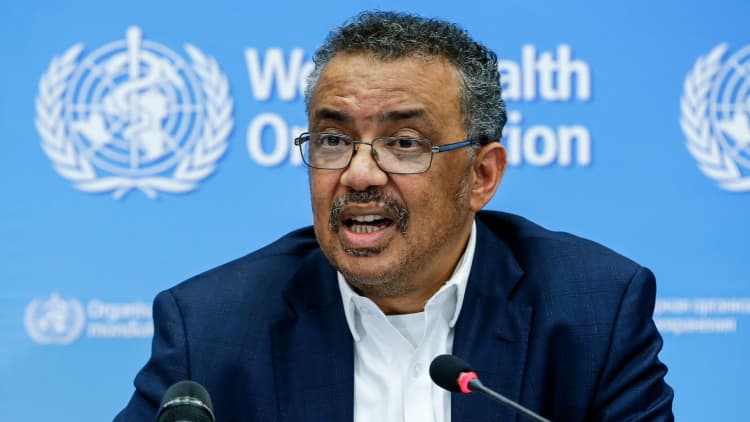
World Health Organization officials are concerned about new coronavirus cases confirmed in France and the U.K. that were transmitted without any travel history to China.
Five British citizens contracted the virus in the French Alpine town of Contamines-Montjoie, health authorities said Sunday. On Monday, the U.K. said it confirmed new cases linked to a British man who went a conference in Singapore.
"The detection of this small number of cases could be the spark that becomes a bigger fire, but for now it's only a spark," WHO Director-General Tedros Adhanom Ghebreyesus told reporters Monday at the organization's headquarters in Geneva.
"Our objective remains containment," he said. "We call on all countries to use the window of opportunity we have to prevent a bigger fire."
World health officials said the respiratory disease, which has sickened more than 40,000 people worldwide and killed at least 910, mostly in China, is capable of spreading through human-to-human contact, droplets carried through sneezing and coughing, and germs left on inanimate objects. Symptoms can include a sore throat, runny nose, fever or pneumonia and can progress to multiple organ failure or death in some severe cases, they said.
The coronavirus pneumonia produces mild cold symptoms in about 80% of patients, Dr. Sylvie Briand, head of WHO's Global Infectious Hazard Preparedness division, told reporters Monday. About 15% of the people who contract the virus have ended up with pneumonia with 3% to 5% of all patients needing intensive care, she said.
On Friday, WHO said it sent medical supplies such as masks, gloves, gowns and diagnostic tests around the world. It is discouraging stockpiling of protective gear, saying the limited items need to be saved for regions most impacted by the virus. The price of protective gear has increased, while availability has decreased, WHO officials said.
That could have a "knock-on effect" for other ongoing epidemics such as Ebola, Dr. Mike Ryan, executive director of WHO's emergencies program, said Friday.
The agency has set up a referral system where countries that don't have the capacity to run diagnostic tests can send samples to labs located in different regions around the world. Tedros said Monday the agency has identified 168 labs with the needed technology to run tests.
The agency is also preparing to ship an additional 150,000 diagnostic tests after sending out 250,000 last week, he said.
On Friday, the Trump administration said it would commit up to $100 million to help WHO, China and other countries fight the outbreak.

The agency has been asking member countries for donations to help with response efforts after tapping $9 million from its contingency fund for emergencies last week. The agency had received donations from the Bill and Melinda Gates Foundation and from Japan, Tedros said last week.
Tedros said Sunday an advance team for the WHO-led mission to China has departed. It is led by Dr. Bruce Aylward, who served as a special representative for the WHO in the Ebola response effort from 2014 to 2016, according to the WHO website.
WHO's Ryan said Monday the team, working with Chinese scientists, hopes to learn the source of the outbreak and the virus's natural host. He said many of the people on the trip know and had been working with Chinese scientists for many years.
"This is an investigation to learn and support China," he said. "This is not a voyage into the dark."


